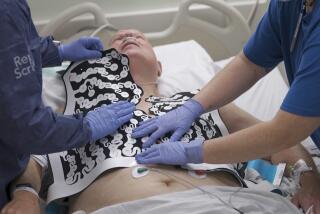Radiation Backed in Prostate Cancer : Medicine: Study shows men treated early with the therapy can expect to live almost as long as men who never contract the malady.
- Share via
Men whose prostate cancers are treated early with radiation therapy can expect to live almost as long as men the same age who never develop the condition, according to results of a 15-year study released in San Diego on Monday.
“The bottom line . . . is that there are substantial numbers of patients who, after 15 years, are cured of the disease by radiation therapy alone,” said Gerald Hanks, author of the study and chairman of the Department of Radiation Oncology at Fox Chase Cancer Center in Philadelphia.
The findings are important because 1 in 11 American males will develop prostate cancer, according to the American Cancer Society. Among men, prostate cancer is the second most common form of cancer after skin cancer and the second most common cause of death after lung cancer.
Hanks’ study population included 1,400 men who, in 1973, received early-stage treatment for cancers that had not yet spread elsewhere. Survival rates were highest for patients whose cancers were discovered very early and were treated solely with radiation therapy.
Among patients whose cancers were discovered very early, the survival rate after 15 years was 45%, equal to the expected survival rate for men who did not develop prostate cancer. For middle-term patients, the survival rate was about 25%. Among patients where the cancer was discovered relatively late, but before it had spread, the survival rate was 21%.
“These rates answer the misconception that radiation doesn’t cure patients . . . that the only option for prostate cancer is surgery,” Hanks said. “That’s simply not true. There’s no evidence that surgery does any better . . . so patients should have the choice of electing surgery or radiation therapy.”
“This is just like breast cancer was 15 years ago, when women were never offered an option other than surgery,” Hanks said. “Elderly men need to question their doctors rather than simply saying ‘yes’ to surgery.”
Prostate cancer is now treated either with surgery or radiation therapy or a combination.
However, there is a “marked difference throughout the country on how it is treated,” said Karl Herwig,head of the Urology Division at Scripps Clinic & Research Foundation. “In some areas radiation treatment is strong . . . in others surgery is stronger.
“No matter which therapy, for early carcinoma of the prostate, it is a curable disease when we catch it early,” Herwig said. “That’s the nice thing about it.”
Hanks’ study “gives more data to support radiation therapy, which is a good, viable option,” Herwig said. “What we need for both radiation and surgery is more long-term data. When we’re talking about survival rates, five and 10 years aren’t as important as 15 years and longer.”
Nationwide, an estimated 132,000 new cases of prostate cancer will be reported in 1992, including 13,000 in California. Nationwide, 34,000 deaths will occur, including an estimated 3,400 in California.
Hanks presented study findings at the American Society for Therapeutic Radiology and Oncology annual meeting in San Diego.






